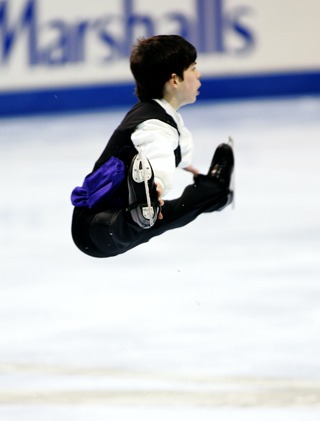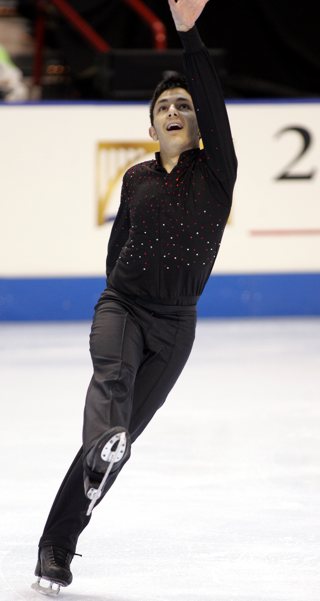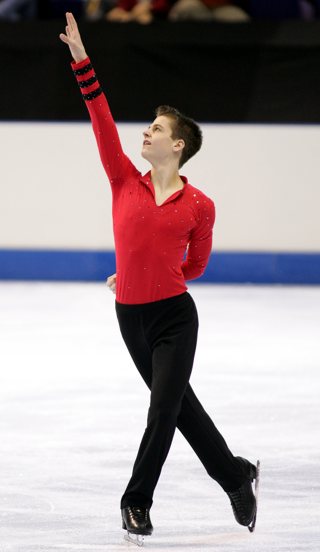|
|
Text and photos copyright 2007 by George S. Rossano |
||||||||||||||||||||||||||||||||||||||||||||||||||||||||
|
|
Text and photos copyright 2007 by George S. Rossano |
||||||||||||||||||||||||||||||||||||||||||||||||||||||||
|
Just squeezing into first place was Armin Mahbanoozadeh. He won mainly on the strength of his elements, for which he received the highest element points. He landed triple Lutz - double toe and triple flip. His spins and sequences were levels 3 or 4. His GoEs were mostly 0s, with a smattering of -1s. Only the triple flip received a majority of 1s. The landing on the double toe was marginal, and five judges scored the combination -1. His Program Components were respectable, in the mid to high 4s, but were fourth best of the group. Skating skills were an obvious strength. The choreography to his music "Beetlejuice" was pedestrian, but he made the most of what he had. Close behind in second place was Scott Dyer. He landed triple Salchow, triple toe - double toe, and double Axel. Although a less difficult program (as measured by Base Value) than Mahbanoozadeh's, he received higher GoEs. Still, the greater quality wasn't enough to overcome the Base Value deficit. Where he made up ground was in the Program Components. His were the second highest component scores. Skating to "Espana Cani" his was a well choreographed program that was presented with speed and enthusiasm. Alexander Johnson placed third, 0.88 points back. His performance was proceeding splendidly with triple Lutz - double toe and triple flip, and level 3 spins and sequences, only to single the axel in his final element. That error cost him more than enough points to have moved into first place. Skating to Saint-Saens Cello Concerto No. 1. he received the highest Program Component scores of the group. Like so many of the men in this group, Max Aaron attempted triple Lutz - double toe and triple flip. He missed the triple Lutz, receiving GoEs of -2 and -3, and did not get off the second jump. On the flip, he landed on the toe and received GoEs of 0s and -1s. These were two erros cost him over three points. Respectable Program Components, in the mid-4s to 5s, however, helped keep him in the running, and he remains well within medal range, 2.18 points back. Sitting in fifth place is Alexander Aiken. He landed triple Lutz - double toe, but then fell on the following triple flip. With the deduction, this was a four point error. Perhaps shaken by the spill in the flip, the following sit spin, was poorly done. It was level 4 but received six marks of -1 for GoEs. Like the other men in the top six, his Program Components were in the mid-4s to 5s, third best of the group. Alexander Zahradnicek, placed sixth in the short, the result of errors on two jump elements. His opening Triple Lutz - double toe received eight GoEs of -1, and his attempt at triple flip was downgraded to a double. It also looked two footed to me. In any event, it received GoEs of -2s and -3s, and he lost 4.57 points in the process. Keegan Messing, who was my favorite coming into the competition, shot himself in the foot by landing triple Lutz - single toe, instead of double toe. Since a triple double is required, the lower rotation jump forced GoEs of -3 and a loss of three points. Messing is now barely in range of a medal, but with the only triple Axel in the group he still has his chance to medal. It is interesting to note (at least to me) that nine of the twelve men attempted triple Lutz - double toe for their combination jump, while in the Ladies Short Program, only one lady landed a jump more difficult than triple Salchow. The technical level of the men currently blows away the ladies in the Novice division. |
|||||||||||||||||||||||||||||
|
Armin Mahbanoozadeh was the most consistent of the top men, placing first in the short and second in the long. He had a clean skate going, in a classical program to Tchaikovsky's Symphony No.5, until near the end, at the last jump element, when he fell on triple toe loop. He landed five triples, through triple Lutz. His typical Program Component marks were 5s, which are respectable for the Novice division, but his main strengths are jumps and spins. His step sequence was called at level 1, and his interpretation lagged other skills in his skating. With a third place finish in both the short and the long, Alexander Johnson placed second overall. He attempted five triples, but had errors on two. In his opening triple flip he put his hand down hard, and received GoEs, of -2 and -3. Later in the program he again put his hand down, this time on triple toe - double toe - double lop, for GoEs of -1. Skating to "Autumn", from "The Season" by Glazunov he received Program Components in the high 4s to 5s. They were the highest of the group, with his greatest strength in his interpetation of a well presented program. After a troubled combination jump left Keegan Messing in seventh place in the Short Program, he came back strong in the Free Skate, winning this segment, and moving up to place third overall. He landed all the triple jumps, toe loop through triple Axel. The Axel was around but weakly landed, perhaps two footed. He received GoEs of -1s and -2s. This is the third time I have seen him get credit for the jump this season, and in each case it was around, but not securely landed. Except for a combination spin that was called level 4, his other spins and step sequence were all level 1 or 2. Skating to the 'Pirates of the Caribbean" soundtrack, his Program Components were in the mid to upper 5s, and were fourth best among the top four skaters in this division. Scott Dyer, who placed second in the Short Program, placed fourth in the long for a fourth place finish. Dyer had the most developed presentation of the group, skating to Dvorak's Cello Concerto in B Minor", and earned the highest Program Components of the group. However, three error in his jumps cost him dearly. He fell on an attempt at triple Lutz that was downgraded in the second element of the program. Later, an attempt at triple loop was also downgraded, and in the last jump element he received negative GoEs for a triple Salchow - double toe - double loop combination. Less than five points separated the top five men, and only 0.89 points separated second and third place. Below the top four, the quality of the group dropped, with nearly 9 points separating fourth and fifth place. To their credit, however, this is because the lower placing men attempted the difficult triple jumps, but with inconsistent success. The fifth place man, Max Aaron, for example, attempted all the triple jumps through triple Lutz, but received negative GoEs for all of them but the triple Salchow. Looking back to past years, the depth in men's skating was not all that great in U.S. Figure skating, particularly compared to the ladies. That is no longer the case. The Novice and Junior men at this years Championships show that there is a lot of talent in the men's events working their way up through the system. |
|||||||||||||||||||||||||||||
 |
 |
 |
| Keegan Messing | Armin Mahbanoozadeh | Alexander Johnson |